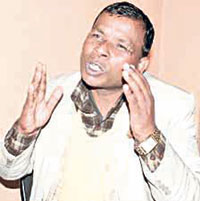KATHMANDU, July 6: The budget allocated district-wise for irrigation and coping with water-induced disasters in the next fiscal year has been increased disproportionately in Saptari, home district of Minister for Irrigation Umesh Yadav. He was elected from Saptari constituency no. 3 on a CPN (Maoist Centre) ticket.
 -Irrigation Minister Umesh Yadav
-Irrigation Minister Umesh Yadav
According to government officials, the intention behind the disproportionate allocation is distribution of funds to cadres of the minister's party through programs farmed out to consumer groups. Yadav was one of the lawmakers throwing chairs in Parliament in January, 2015 because of differences over the issuing of the Constitution.
Budget allocation for the district for next fiscal year has been increased more than threefold to Rs 1.03 billion from Rs 290 million in the current fiscal year. The jump in allocation is apparently meant for wooing the minister's voters, it is stated. The allocation for the district is 4.5 percent of the total budget of Rs 23 billion allocated for this sector. The average allocation for a district is Rs 300 million, or 1.33 percent of the total budget amount.
About three dozen lawmakers have raised questions over the way taxpayer money has been allocated, without any semblance of a balanced development approach. Yadav is scheduled to answer the questions in Parliament on Wednesday.
The number of projects in Saptari district has now been increased to 294 from about seven dozen in the current fiscal.
Karnali’s budget for next FY is Rs 36.54 billion; investment su...

The projects have been fragmented into small ones that can be implemented through consumer groups. A government official who did not want to be named said distributing 20 percent of the total budget among local leaders is common when implementation is through consumer groups.
A project or program worth up to Rs 6 million can be spent through consumer groups without going through any legal procurement process.
Such spending will neither create jobs nor generate consumer demand, economists say. The project and program-wise budget allocations range from Rs 50,000 to Rs 2.5 million, and most allocations are for projects of Rs 500,00 and Rs 1 million. Newly added projects include feasibility studies for different irrigation projects, but the amounts allocated for 66 such projects are less than Rs 10,000 per project. Similar amounts have been allocated for 15 programs for identifying the projects.
"Small irrigation projects can make a difference in poverty eradication and retain youths in agriculture but too many projects and the small amounts allocated for each project signals a failure to prioritize and meet the expected outcomes," said Shiva Kumar Sharma, retired director general of the Department of Irrigation.
Officials at the Ministry of Irrigation say Minister Yadav piled pressure on budget officials to add new programs for his district while discontinuing several undergoing projects. Nepali Congress Lawmaker Ram Hari Khatiwada raised the issue in Parliament two weeks ago. "He could not even act as a leader of his own party let alone the whole country," Khatiwada said.
However, Sagar Kumar Rai, spokesperson of the ministry, admitted that a larger share of the budget has been allocated to Saptari, adding that there were naturally more demands from the minister's own constituency.



































